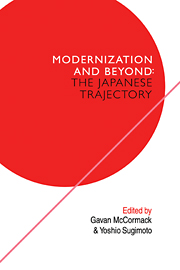Book contents
- Frontmatter
- Contents
- Contributors
- Introduction: modernization and beyond
- I Popular culture: tradition and ‘modernization’
- II Popular movements: alternative visions of ‘modernization’
- 4 Popular movements in modern Japanese history
- 5 For self and society: Seno'o Girō and Buddhist socialism in the post-war Japanese peace movement
- III Uneven development and its discontents
- IV Sex, politics and ‘modernity’
- V ‘Modernization’ and ‘modernity’: theoretical perspectives
- Glossary
- Index
4 - Popular movements in modern Japanese history
Published online by Cambridge University Press: 04 August 2010
- Frontmatter
- Contents
- Contributors
- Introduction: modernization and beyond
- I Popular culture: tradition and ‘modernization’
- II Popular movements: alternative visions of ‘modernization’
- 4 Popular movements in modern Japanese history
- 5 For self and society: Seno'o Girō and Buddhist socialism in the post-war Japanese peace movement
- III Uneven development and its discontents
- IV Sex, politics and ‘modernity’
- V ‘Modernization’ and ‘modernity’: theoretical perspectives
- Glossary
- Index
Summary
I propose to examine the common characteristics of popular movements in Japan over approximately the last hundred years. Of course the popular movements over this period were of many different kinds, there were many of them, historical conditions differed, and it is difficult to generalize. However, no matter which of them one considers, the objective of the movement was not properly realized; most of them were blocked along the way, or defeated.
What can this mean? Before clarifying the reasons for it there are certain preliminaries to be dealt with. First, the popular movements that are dealt with here are confined to independent movements started by ordinary people in accordance with their own social needs or the requirements of their livelihood. Movements of intellectuals or movements led by professional politicians and the like are not included.
However, since popular movements occur as the summation of social contradictions, a purely independent popular movement cannot exist in fact; in some form or other all are subject to the influence of state ideology or the thinking of intellectuals.
- Type
- Chapter
- Information
- The Japanese TrajectoryModernization and Beyond, pp. 69 - 86Publisher: Cambridge University PressPrint publication year: 1988

